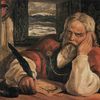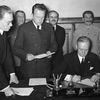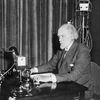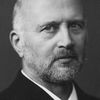11.5.2025 | 11:05
ReykjavÝk, maÝ 2025
 Al■jˇlegárßstefna var haldin Ý ReykjavÝk 8. maÝ 2025 vegna bˇkar minnar, Conservative Liberalism, North and South: Grundtvig, Einaudi and their Relevance Today, ■ar sem Úg ber saman norrŠnu leiina Ý al■jˇasamskiptum (sjßlfsprotti samstarf vi lßgmarksafsal fullveldis) og hina evrˇpsku (aukna mistřringu frß BrŘssel).
Al■jˇlegárßstefna var haldin Ý ReykjavÝk 8. maÝ 2025 vegna bˇkar minnar, Conservative Liberalism, North and South: Grundtvig, Einaudi and their Relevance Today, ■ar sem Úg ber saman norrŠnu leiina Ý al■jˇasamskiptum (sjßlfsprotti samstarf vi lßgmarksafsal fullveldis) og hina evrˇpsku (aukna mistřringu frß BrŘssel).
Geir H. Haarde, fyrrverandi forsŠtisrßherra, setti rßstefnuna og kva frˇlegt a sjß Snorra Sturluson og Nikolaj F. S. Grundtvig talda ß meal hugmyndasmia frjßlshyggjunnar, eins og gert vŠri Ý bˇk minni.
Danski sagnfrŠingurinn dr. David Gress benti ß, a ß nÝtjßndu ÷ld hefu ■jˇernishyggja og frjßlshyggja ßtt samlei Ý Evrˇpu. En n˙ ynni hin umboslausa framkvŠmdastjˇrn Evrˇpusambandsins markvisst gegn ■jˇrÝkjum, og vŠri almenningur ˇum a komast ß ■ß skoun, a ekkert tillit vŠri teki til hans Ý BrŘssel.
Prˇfessor Alberto Mingardi frß ═talÝu rŠddi um hugmyndir Luigis Einaudis, forseta ═talÝu 1948–1955, um frjßlslynt bandalag EvrˇpurÝkja, en ■vÝ miur hefi Evrˇpusambandi stefnt Ý ■ver÷fuga ßtt frß ÷ndverum tÝunda ßratug sÝustu aldar, ■egar ■rˇun hˇfst ˙r rÝkjasambandi Ý sambandsrÝki.
Borwick lßvarur, sem situr Ý bresku lßvaradeildinni, lřsti hreyfingunni fyrir ˙tg÷ngu Breta ˙r Evrˇpusambandinu, en tilgangur hennar hefi umfram allt veri, a Bretland endurheimti sjßlfstŠi sitt, en ■yrfti ekki a l˙ta erlendu mistjˇrnarvaldi.
Sigmundur DavÝ Gunnlaugsson, fyrrverandi forsŠtisrßherra, mŠlti lokaor og sagist Štla a berjast me oddi og egg gegn inng÷ngu ═slands Ý Evrˇpusambandi.
(Frˇleiksmoli Ý Morgunblainu 10. maÝ 2025.)
Stjˇrnmßl og samfÚlag | Breytt 20.6.2025 kl. 16:27 | Slˇ | Facebook
11.5.2025 | 09:59
Hvert stefnir Evrˇpa?
 Sjaldan hefur veri meiri ˇvissa Ý al■jˇamßlum en um ■essar mundir. BandarÝkin rÚu ˙rslitum um, a Bandamenn sigruu Íxulveldin Ý seinni heimsstyrj÷ld, og eftir ■a gßtu EvrˇpurÝkin l÷ngum treyst ■vÝ, a hinn ÷flugi her BandarÝkjanna, me vopnab˙r fullt af kjarnorku- og vetnissprengjum, veri ■au gegn ßsŠlni r˙ssneskra komm˙nista. Smßm saman ˇx ■eirri skoun ■ˇ fylgi Ý BandarÝkjunum, a ■au Šttu ekki a kosta varnir Evrˇpu, heldur EvrˇpurÝkin sjßlf, ■ˇtt ■a vŠri ekki fyrr en Donald Trump var kj÷rinn forseti, fyrst 2016 og sÝan 2024, a bandarÝsk stjˇrnv÷ld hŠttu a sitja vi orin tˇm. N˙ vera EvrˇpurÝkin a standa ß eigin fˇtum, kosta sjßlf sÝnar varnir. Jafnframt hefur Evrˇpusambandi breyst og ekki til batnaar. Ůa var upphaflega stofna til a sameina ■jˇir Evrˇpu um a velja frekar ver en sver, frekar viskipti en herna. Ůa vann stˇrvirki ß fyrstu ■rjßtÝu og fimm starfsßrum sÝnum, frß 1957 til 1992, ■egar innri markaur Evrˇpu var til og samkeppni framleienda um hylli neytenda harnai ÷llum Ý hag. En ß ÷ndverum tÝunda ßratug sÝustu aldar skipti Evrˇpusambandi um ham. Ůa hŠtti a einbeita sÚr a frjßlsum viskiptum og tˇk ■ess Ý sta a setja atvinnulÝfi rammar skorur me ■eim afleiingum, a rÝki sambandsins drˇgust stˇrlega aftur ˙r BandarÝkjunum Ý efnahagsmßlum. Sambandi hlˇ tollm˙ra Ý kringum Evrˇpu. Ůa olli gremju Ý BandarÝkjunum og var Trump BandarÝkjaforseta hvatning til a hefja hi ˇheppilega tollastrÝ sitt. Enn fremur virist svo um ■essar mundir sem Vesturveldin standi ekki einhuga saman gegn hinum nřju ÷xulveldum, R˙sslandi, KÝna, ═ran og Norur-Kˇreu. ŮvÝ mß spyrja: Hvert stefnir Evrˇpa? Ůetta verur rŠtt ß fundi RSE, Rannsˇknamist÷var Ý samfÚlags- og efnahagsmßlum, og Stofnunar stjˇrnsřslufrŠa og stjˇrnmßla Ý gamla SjßlfstŠish˙sinu vi Austurv÷ll (Nasa) fimmtudaginn 8. maÝ kl. 16.30. Tilefni fundarins er nř˙tkomin bˇk mÝn, Conservative Liberalism, North and South: Grundtvig, Einaudi and their Relevance Today, sem Ýhaldsflokkarnir Ý Evrˇpu gßfu ˙t Ý BrŘssel og hlaa mß upp af netinu.
Sjaldan hefur veri meiri ˇvissa Ý al■jˇamßlum en um ■essar mundir. BandarÝkin rÚu ˙rslitum um, a Bandamenn sigruu Íxulveldin Ý seinni heimsstyrj÷ld, og eftir ■a gßtu EvrˇpurÝkin l÷ngum treyst ■vÝ, a hinn ÷flugi her BandarÝkjanna, me vopnab˙r fullt af kjarnorku- og vetnissprengjum, veri ■au gegn ßsŠlni r˙ssneskra komm˙nista. Smßm saman ˇx ■eirri skoun ■ˇ fylgi Ý BandarÝkjunum, a ■au Šttu ekki a kosta varnir Evrˇpu, heldur EvrˇpurÝkin sjßlf, ■ˇtt ■a vŠri ekki fyrr en Donald Trump var kj÷rinn forseti, fyrst 2016 og sÝan 2024, a bandarÝsk stjˇrnv÷ld hŠttu a sitja vi orin tˇm. N˙ vera EvrˇpurÝkin a standa ß eigin fˇtum, kosta sjßlf sÝnar varnir. Jafnframt hefur Evrˇpusambandi breyst og ekki til batnaar. Ůa var upphaflega stofna til a sameina ■jˇir Evrˇpu um a velja frekar ver en sver, frekar viskipti en herna. Ůa vann stˇrvirki ß fyrstu ■rjßtÝu og fimm starfsßrum sÝnum, frß 1957 til 1992, ■egar innri markaur Evrˇpu var til og samkeppni framleienda um hylli neytenda harnai ÷llum Ý hag. En ß ÷ndverum tÝunda ßratug sÝustu aldar skipti Evrˇpusambandi um ham. Ůa hŠtti a einbeita sÚr a frjßlsum viskiptum og tˇk ■ess Ý sta a setja atvinnulÝfi rammar skorur me ■eim afleiingum, a rÝki sambandsins drˇgust stˇrlega aftur ˙r BandarÝkjunum Ý efnahagsmßlum. Sambandi hlˇ tollm˙ra Ý kringum Evrˇpu. Ůa olli gremju Ý BandarÝkjunum og var Trump BandarÝkjaforseta hvatning til a hefja hi ˇheppilega tollastrÝ sitt. Enn fremur virist svo um ■essar mundir sem Vesturveldin standi ekki einhuga saman gegn hinum nřju ÷xulveldum, R˙sslandi, KÝna, ═ran og Norur-Kˇreu. ŮvÝ mß spyrja: Hvert stefnir Evrˇpa? Ůetta verur rŠtt ß fundi RSE, Rannsˇknamist÷var Ý samfÚlags- og efnahagsmßlum, og Stofnunar stjˇrnsřslufrŠa og stjˇrnmßla Ý gamla SjßlfstŠish˙sinu vi Austurv÷ll (Nasa) fimmtudaginn 8. maÝ kl. 16.30. Tilefni fundarins er nř˙tkomin bˇk mÝn, Conservative Liberalism, North and South: Grundtvig, Einaudi and their Relevance Today, sem Ýhaldsflokkarnir Ý Evrˇpu gßfu ˙t Ý BrŘssel og hlaa mß upp af netinu.
David Gress: Til varnar ■jˇrÝkinu
 Einn frummŠlandi er danski sagnfrŠingurinn dr. David Gress. Hann hefur veri frŠimaur ß Hoover-stofnuninni Ý KalifornÝu (■ar sem Úg kynntist honum fyrst) og vÝar og gefi ˙t fj÷lda bˇka, en hÚr nefni Úg aeins tvŠr. ═ bˇkinni From Plato to Nato: The Idea of the West and its Opponents (Frß Platˇ til Natˇ. Hugmyndin um vestri og ˇvinir ■ess) gagnrřnir Gress ■ß s÷guritun, sem dregur beina lÝnu frß ritum grÝsk-rˇmverskra h÷funda til bandarÝsku byltingarmannanna 1776 og eftirmanna ■eirra. Ůessi s÷guritun kom meal annars fram Ý byrjendanßmskeium Ý bandarÝskum hßskˇlum um vestrŠna menningu og Ý ritr÷um um mestu bŠkur Vesturlanda. Gress telur, a Ý ■essa s÷guritun vanti hinar germ÷nsku og kristnu rŠtur vestrŠnnar menningar. Frelsi sÚ ekki ˇhlutbundi hugtak, sem svifi hafi yfir v÷tnum Ý aldanna rßs, heldur hafi ■a smßm saman myndast Ý germ÷nskum Šttbßlkum, ■ar sem allir voru jafnir og l÷gin voru sammŠli, ekki fyrirmŠli a ofan. VestrŠn menning sÚ sam■Štting ■riggja meginstrauma, hins grÝsk-rˇmverska, kristna og germanska. ╔g er sammßla honum um, a hinar germ÷nsku rŠtur frjßlshyggjunnar hafi veri vanmetnar, til dŠmis hugmyndir Snorra Sturlusonar um, a valdhafar ■urfi umbo ■egna sinna og sÚu rÚttrŠkir, brjˇti ■eir alvarlega l÷g og venjur Ý rÝkjum sÝnum.
Einn frummŠlandi er danski sagnfrŠingurinn dr. David Gress. Hann hefur veri frŠimaur ß Hoover-stofnuninni Ý KalifornÝu (■ar sem Úg kynntist honum fyrst) og vÝar og gefi ˙t fj÷lda bˇka, en hÚr nefni Úg aeins tvŠr. ═ bˇkinni From Plato to Nato: The Idea of the West and its Opponents (Frß Platˇ til Natˇ. Hugmyndin um vestri og ˇvinir ■ess) gagnrřnir Gress ■ß s÷guritun, sem dregur beina lÝnu frß ritum grÝsk-rˇmverskra h÷funda til bandarÝsku byltingarmannanna 1776 og eftirmanna ■eirra. Ůessi s÷guritun kom meal annars fram Ý byrjendanßmskeium Ý bandarÝskum hßskˇlum um vestrŠna menningu og Ý ritr÷um um mestu bŠkur Vesturlanda. Gress telur, a Ý ■essa s÷guritun vanti hinar germ÷nsku og kristnu rŠtur vestrŠnnar menningar. Frelsi sÚ ekki ˇhlutbundi hugtak, sem svifi hafi yfir v÷tnum Ý aldanna rßs, heldur hafi ■a smßm saman myndast Ý germ÷nskum Šttbßlkum, ■ar sem allir voru jafnir og l÷gin voru sammŠli, ekki fyrirmŠli a ofan. VestrŠn menning sÚ sam■Štting ■riggja meginstrauma, hins grÝsk-rˇmverska, kristna og germanska. ╔g er sammßla honum um, a hinar germ÷nsku rŠtur frjßlshyggjunnar hafi veri vanmetnar, til dŠmis hugmyndir Snorra Sturlusonar um, a valdhafar ■urfi umbo ■egna sinna og sÚu rÚttrŠkir, brjˇti ■eir alvarlega l÷g og venjur Ý rÝkjum sÝnum.
═ bˇkinni EU Europas fjende (Evrˇpusambandi: Ëvinur Evrˇpu) gagnrřnir Gress harlega ■rˇun Evrˇpusambandsins frß 1992, ■egar ■a hefur veri a reyna a breytast ˙r rÝkjasambandi Ý sambandsrÝki, ˙r opnum markai Ý loka rÝki. Gress telur, a Evrˇpusambandi hafi villst af lei. Ůa Ý■yngi atvinnulÝfinu me sÝfellt fleiri og lengri reglugerum. Ůa sÚ undir ßhrifum umhverfis÷fgafˇlks, sem vilji st÷va hagv÷xt, og svokallaa fj÷lmenningarsinna, sem fjandskapist vi kristna tr˙, ■jˇmenningu og ■jˇrÝki. Ef svo fer sem horfir, muni m˙slimar taka stjˇrn Ý voldugustu Evrˇpul÷ndunum, en margt Ý menningu ■eirra sÚ andstŠtt menningu okkar, til dŠmis kvenfyrirlitning og and˙ ß sparsemi, vinnusemi og hagvexti. A ■essu stular holskefla innflytjenda frß m˙slimarÝkjum, segir Gress. ═ hinni nř˙tkomnu bˇk minni er kafli um einn landa Gress, Nikolai F. S. Grundtvig, sem var frjßlslyndur stuningsmaur ■jˇrÝkisins. Frˇlegt verur a vita, hva Gress segir um framtÝ ■jˇrÝkisins Ý Evrˇpu.
Alberto Mingardi: Frjßlslynt Evrˇpusamband
 Annar frummŠlandi er Ýtalski heimspekingurinn dr. Alberto Mingardi, sem er sÚrfrŠingur Ý ritum Herberts Spencers, en hefur lÝka skrifa um margt anna. Mingardi er forst÷umaur Bruno Leoni stofnunarinnar Ý MÝlanˇ (sem fornmenn k÷lluu Melansborg) og prˇfessor Ý hßskˇla upplřsingatŠkni og tungumßla, UILM, Ý s÷mu borg. Hann er jafnframt gistifrŠimaur Ý Cato stofnuninni Ý Washington-borg og ritari Mont Pelerin samtakanna, sem Friedrich A. von Hayek, Milton Friedman og Karl R. Popper stofnuu Ý Sviss ßri 1947, en ■au eru al■jˇlegt mßlfundafÚlag frjßlslyndra frŠimanna, sem hittast reglulega. ═ hinni nř˙tkomnu bˇk minni er einmitt kafli um einn stofnanda samtakanna, vin Hayeks, Luigi Einaudi, sem ■ß var selabankastjˇri ═talÝu, en var forseti landsins 1948–1955. Einaudi var frjßlslyndur hagfrŠingur og er almennt talinn einn af „ferum Evrˇpusambandsins“.
Annar frummŠlandi er Ýtalski heimspekingurinn dr. Alberto Mingardi, sem er sÚrfrŠingur Ý ritum Herberts Spencers, en hefur lÝka skrifa um margt anna. Mingardi er forst÷umaur Bruno Leoni stofnunarinnar Ý MÝlanˇ (sem fornmenn k÷lluu Melansborg) og prˇfessor Ý hßskˇla upplřsingatŠkni og tungumßla, UILM, Ý s÷mu borg. Hann er jafnframt gistifrŠimaur Ý Cato stofnuninni Ý Washington-borg og ritari Mont Pelerin samtakanna, sem Friedrich A. von Hayek, Milton Friedman og Karl R. Popper stofnuu Ý Sviss ßri 1947, en ■au eru al■jˇlegt mßlfundafÚlag frjßlslyndra frŠimanna, sem hittast reglulega. ═ hinni nř˙tkomnu bˇk minni er einmitt kafli um einn stofnanda samtakanna, vin Hayeks, Luigi Einaudi, sem ■ß var selabankastjˇri ═talÝu, en var forseti landsins 1948–1955. Einaudi var frjßlslyndur hagfrŠingur og er almennt talinn einn af „ferum Evrˇpusambandsins“.
Einaudi var al■jˇahyggjumaur, heimsborgari. Hann vildi sem von var, a EvrˇpurÝkin hŠttu a fˇrna ˇtal lÝfum ungra og efnilegra manna Ý strÝum. Ůess Ý sta Šttu ■au a stofna rÝkjasamband, ■ˇtt ■jˇrÝkin skyldu standa ßfram. En hann taldi, a lauslegt bandalag eins og Ůjˇabandalagi milli strÝa vŠri allt of veikt til a geta tryggt fri og frjßls viskipti. Sjßlfur hef Úg ■ˇ varpa fram ■eirri hugmynd, a Evrˇpusambandi hefi frekar ßtt a leita fyrirmyndar um framtÝar■rˇun áÝ Norurlandarßi en BandarÝkjunum. Norurlandarß hefur veri vettvangur sjßlfsprottinnar samhŠfingar aildarlandanna Ý hŠgum skrefum me lßgmarksafsali fullveldis. ═ bˇk minni reifa Úg einmitt „norrŠna lei“ Ý al■jˇamßlum, sem gŠti ßtt erindi til alls heims. 1) RÚttur til askilnaar: Noregur 1905, Finnland 1917, ═sland 1918. 2) LandamŠrabreytingar vi atkvŠagreislur: SlÚsvÝk 1920. 3) Sjßlfstjˇrn ■jˇabrota: ┴landseyingar, Samar, FŠreyingar, GrŠnlendingar. 4) Dˇmstˇlar skera ˙r deilumßlum: Um ┴landseyjar 1921 og Austur-GrŠnland 1933.
Borwick lßvarur: ┌tganga Breta ˙r ESB
 Ůriji frummŠlandinn er gamall vinur minn ˙r Mont Pelerin samt÷kunum, Jamie Borwick lßvarur, fimmti barˇn af Borwick. Hann er einn af ■eim nÝutÝu aalsm÷nnum, sem kj÷rnir eru til setu Ý deildinni, og skipar sÚr ■ar Ý r÷ Ýhaldsmanna. Eiginkona hans, Victoria, hefur raunar seti ß ■ingi lÝka fyrir ═haldsflokkinn. Borwick hefur stunda řmis st÷rf og seti Ý m÷rgum stjˇrnum, en um skei rak hann fyrirtŠki, sem framleiir sv÷rtu leigubÝlana Ý Lund˙naborg. Hann var eindreginn stuningsmaur ˙tg÷ngu Breta ˙r Evrˇpusambandinu, Brexit.
Ůriji frummŠlandinn er gamall vinur minn ˙r Mont Pelerin samt÷kunum, Jamie Borwick lßvarur, fimmti barˇn af Borwick. Hann er einn af ■eim nÝutÝu aalsm÷nnum, sem kj÷rnir eru til setu Ý deildinni, og skipar sÚr ■ar Ý r÷ Ýhaldsmanna. Eiginkona hans, Victoria, hefur raunar seti ß ■ingi lÝka fyrir ═haldsflokkinn. Borwick hefur stunda řmis st÷rf og seti Ý m÷rgum stjˇrnum, en um skei rak hann fyrirtŠki, sem framleiir sv÷rtu leigubÝlana Ý Lund˙naborg. Hann var eindreginn stuningsmaur ˙tg÷ngu Breta ˙r Evrˇpusambandinu, Brexit.
Borwick hefur ßreianlega margt a segja. ١tt Evrˇpusambandi hafi Ý ori kvenu virt rÚttinn til askilnaar, hefur ■a reynt eftir megni a torvelda ˙tg÷ngu Breta ˙r sambandinu, og vi ■a bŠtist, a ßhrifamikill hˇpur ˙r bresku valdastÚttinni hefur unni markvisst gegn ÷llum tilraunum til a nřta ■au tŠkifŠri, sem ˙tgangan veitti. Ůeim ailum Ý BandarÝkjunum, sem vilja sem minnst af ÷rum l÷ndum vita, hefur einnig vaxi ßsmegin. Bretland stendur ■vÝ a sumu leyti eitt Ý Evrˇpu, svipa og ═sland og Noregur, ■ˇtt ÷ll sÚu l÷ndin raunar Ý Atlantshafsbandalaginu. Samherji Borwicks Ý lßvaradeildinni, Daniel Hannan lßvarur, hefur ■vÝ varpa fram ■eirri hugmynd, a ■au bresku samveldisl÷nd, sem lÝkust eru a menningu, ┴stralÝa, Nřja Sjßland, Kanada og Stˇra Bretland, stofni bandalag, sem stundi frÝverslun og komi sÚr upp sameiginlegum v÷rnum, efli meal annars kjarnorkuvopnabirgir Breta, ■ˇtt ■a yri a vÝsu mj÷g kostnaarsamt. Ůa vŠri forvitnileg spurning, hvort ═sland Štti ■ar heima, jafnframt ■vÝ sem ■a myndi treysta varnarsamstarfi vi BandarÝkin og innan Atlantshafsbandalagsins. Ůetta gŠti allt fari saman. Aukřfingurinn Elon Musk hefur sÝan varpa fram annarri athyglisverri hugmynd, a Norur-AmerÝka og Evrˇpa (vestan R˙sslands og HvÝta-R˙sslands) stofni eitt risastˇrt frÝverslunarsvŠi ßn tolla og annarra takmarkana ß verslun.
UmbŠtur ß Evrˇpusambandinu
═ hinni nř˙tkomnu bˇk minni ver Úg ■jˇrÝki me s÷mu r÷kum og Grundtvig, sem einingarafl og vettvang til a rŠkta ■a, sem okkur er eiginlegt og okkur ■ykir Šskilegt. Ůar reifa Úg einnig hina norrŠnu lei Ý al■jˇamßlum og geri till÷gur um umbŠtur ß Evrˇpusambandinu, sem gŠtu hleypt nřju lÝfi Ý ■a. Geir H. Haarde, fyrrverandi forsŠtisrßherra, mŠlir nokkur or Ý byrjun fundarins og Sigmundur DavÝ Gunnlaugsson, fyrrverandi forsŠtisrßherra, Ý lok fundarins, en jafnframt bregast tveir ungir menn vi orum rŠumanna, ■eir Haakon Teig, leitogi norskra Ýhaldsst˙denta, og J˙lÝus Viggˇ Ëlafsson, formaur Heimdallar. Agangur er ˇkeypis og allir velkomnir, en fundinum střrir Diljß Mist Einarsdˇttir al■ingismaur. ═ mˇtt÷kunni eftir fundinn mun Úg flytja minni Hayeks, sem ß afmŠli 8. maÝ.
(Grein Ý Morgunblainu 7. maÝ 2025.)
á
Stjˇrnmßl og samfÚlag | Breytt s.d. kl. 10:32 | Slˇ | Facebook
11.5.2025 | 09:52
Ůegar sˇsÝalisminn var st÷vaur
 Ůegar Úg var Ý hßskˇla fyrir fimmtÝu ßrum, var oft bent ß SvÝ■jˇ sem dŠmi um vel heppnaan sˇsÝalisma, en ÷llum var ljˇst, a sˇsÝalisminn hefi misheppnast Ý R˙sslandi, KÝna og fylgirÝkjum ■eirra. ŮvÝ fˇr ■ˇ fjarri, a SvÝar hefu hrundi Ý framkvŠmd sˇsÝalisma. Laust eftir mija nÝtjßndu ÷ld h÷fu frjßlshyggjumenn eins og Johan August Gripenstedt og Louis De Geer v÷ld, og ■eir gerbreyttu SvÝ■jˇ, snarjuku ■ar atvinnufrelsi me ■eim afleiingum, a hagv÷xtur var ■ar nŠstu hundra ßr einn hinn ÷rasti Ý heimi.
Ůegar Úg var Ý hßskˇla fyrir fimmtÝu ßrum, var oft bent ß SvÝ■jˇ sem dŠmi um vel heppnaan sˇsÝalisma, en ÷llum var ljˇst, a sˇsÝalisminn hefi misheppnast Ý R˙sslandi, KÝna og fylgirÝkjum ■eirra. ŮvÝ fˇr ■ˇ fjarri, a SvÝar hefu hrundi Ý framkvŠmd sˇsÝalisma. Laust eftir mija nÝtjßndu ÷ld h÷fu frjßlshyggjumenn eins og Johan August Gripenstedt og Louis De Geer v÷ld, og ■eir gerbreyttu SvÝ■jˇ, snarjuku ■ar atvinnufrelsi me ■eim afleiingum, a hagv÷xtur var ■ar nŠstu hundra ßr einn hinn ÷rasti Ý heimi.
Jafnaarmenn komust a vÝsu til valda Ý SvÝ■jˇ 1932, en fˇru varlega og h÷fnuu stÚttabarßttu. Eftir heimskreppuna og heimsstyrj÷ldina seinni vildu ■ˇ sumir ■eirra undir forystu hagfrŠingsins Gunnars Myrdals taka upp mistřran ߊtlunarb˙skap. En ■ß var ■řdd ß sŠnsku bˇk, ■ar sem ensk-austurrÝski hagfrŠingurinn Friedrich A. von Hayek fŠri r÷k fyrir ■vÝ, a slÝkur ߊtlunarb˙skapur vŠri „leiin til ßnauar“. Bˇkin olli h÷rum deilum (planhushňllningsdebatten). Einn ■eirra, sem snerist ß sveif me Hayek, var mŠlskugarpurinn og stjˇrnmßlafrŠiprˇfessorinn Herbert Tingsten.
Vori 1945 hlustai ungur Ýslenskur sˇsÝalisti Ý SvÝ■jˇ, Jˇnas H. Haralz, ß Tingsten deila Ý ˙tvarpi vi einn kennara sinn, jafnaarmanninn Karin Kock. „FÚll mÚr ■ungt hversu grßtt Tingsten tˇkst a leika Karinu Kock me beittum mßlflutningi sÝnum, en Úg var a sjßlfs÷gu hlihollur sjˇnarmium hennar,“ skrifai Jˇnas sÝar. SŠnskir jafnaarmenn hurfu nŠstu ßr frß hugmyndum um mistřran ߊtlunarb˙skap og fÚllu Ý sitt fyrra far. Myrdal hraktist frß SvÝ■jˇ. SˇsÝalisminn var st÷vaur. Ůa var sÝan kaldhŠni ÷rlaganna, a ■eir Hayek og Myrdal deildu saman Nˇbelsverlaunum Ý hagfrŠi ßri 1974.
(Frˇleiksmoli Ý Morgunblainu 3. maÝ 2025. Myndin er af Gripenstedt.)
Stjˇrnmßl og samfÚlag | Breytt s.d. kl. 11:03 | Slˇ | Facebook
11.5.2025 | 09:33
Harvard-hßskˇli kveinkar sÚr
Margt hefur veri afreka Ý vestrŠnum hßskˇlum. En ■vÝ miur eru ■eir um ■essar mundir a vera a vÝgjum ˇfrjßlslyndrar hugsunar og einsleitni. Kannanir Ý BandarÝkjunum sřna, a hŠgri menn eru innan vi 10% hßskˇlakennara. Ef til vill var ein besta k÷nnunin hÚr heima starfslokarßstefna mÝn vori 2023, en hana sˇtti aeins einn kennari ˙r stjˇrnmßlafrŠideild, StefanÝa Ëskarsdˇttir. Hinir tuttugu og fimm lÚtu sig allir vanta.
Ůegar Úg kenndi Ý Hßskˇlanum, komst Úg a ■vÝ, a Al■řusamband ═slands kostai nßmskei um vinnumarkainn (sem yfirlřstur marxisti kenndi), Evrˇpusambandi nßmskei um Evrˇpusamruna og Ůrˇunarsamvinnustofnun lokaritgerir um ■rˇunarmßl. Kynntustánemendur ■ß ■eim sjˇnarmium, a ■a vŠri hagv÷xtur, en ekki kjarabarßtta, sem skilai kjarabˇtum, a Evrˇpusambandi hefi breyst Ý ■unglamalegt skriffinnskuveldi og a ■rˇunarasto vŠri oftast asto ßn ■rˇunar, enda yri eina skilvirka ■rˇunin fyrir tilstilli frjßlsra al■jˇaviskipta? (Ůessu styrkjabr÷lti var ■ˇ hŠtt, ef til vill vegna athugasemda minna. Einnig var hŠtt a tala ensku ß deildarfundum eftir andmŠli mÝn, en Hßskˇli ═slands var einmitt stofnaur ß aldarafmŠli Jˇns Sigurssonar ßri 1911, svo a ═slendingar gŠtu numi Ýslenska s÷gu, ekki danska, Ýslensk l÷g, ekki d÷nsk, Ýslenskar bˇkmenntir, ekki danskar.)
N˙ kveinkar Harvard-hßskˇli sÚr undan ■vÝ, a Trump-stjˇrnin vilji skera frelsi starfsmanna hans. Til er einfalt rß vi ■vÝ: a hŠtta a taka vi rÝkisstyrkjum. Og ■essi skˇli var ekki beinlÝnis Ý fararbroddi frelsissinna, ■egar hann rak nřlega fyrsta ■eld÷kka garprˇfastinn, lagaprˇfessorinn Ronald S. Sullivan, ˙r st÷u sinni fyrir a vera verjandi hins ˇgefellda Harveys Weinsteins. KynjafrŠingum Ý Harvard lei ekki vel ˙t af ■essu aukaverkefni Sullivans. En Ý rÚttarrÝki eiga allir heimtingu ß rÚttlßtri mßlsmefer, lÝka hinir ˇgefelldu. Eins og Grundtvig gamli orti: Frelsi er frelsi Loka ekki sÝur en ١rs. Ea eins og Karl Popper sagi mÚr: VÝsindin eiga a vera frjßls samkeppni hugmynda.
(Frˇleiksmoli Ý Morgunblainu 26. aprÝl 2025.)
19.4.2025 | 05:24
Frelsi til a skapa
Ůegar komm˙nisminn hrundi Ý Austur-Evrˇpu og RßstjˇrnarrÝkin liuust Ý sundur ßrin 1989–1991, hÚldu margir, a runnin vŠri upp nř frelsis÷ld. Ůa reyndist a nokkru leyti rÚtt. Um allan heim voru rÝkisfyrirtŠki fŠr Ý hendur einkaaila, sem h÷fu miklu betri skilyri til a reka ■au en skrumarar og skriffinnar. Einstaklingsfrelsi nam nř l÷nd, Indverjar hurfu frß haftastefnu, og um skei virtist jafnvel hi fj÷lmenna KÝnaveldi Štla a skipa sÚr Ý sveit lřrŠisrÝkja. En skjˇtt skipuust veur Ý lofti, sÚrstaklega eftir ßrßs ÷fgam˙slima ß Nřju JˇrvÝk (New York) ßri 2001, hina al■jˇlegu fjßrmßlakreppu ßrin 2007–2009, valdat÷ku Xi Ý KÝnaveldi ßri 2012, kˇrˇnuveirufaraldurinn 2020–2021, endurteknar innrßsir R˙ssa Ý GeorgÝu og ┌kraÝnu og tollastrÝ Ý sta frjßlsra al■jˇaviskipta. Getur veri, a frelsis÷ldin hafi aeins veri skammvinn og mannkyni muni aftur sÝga Ý hi gamla far ofstjˇrnar og lßtlausra stabundinna strÝa? Hvernig getum vi vari og auki ■a frelsi til a skapa, sem hefur veri aal Vesturlanda og kn˙i ßfram framfarir? Um ■a er rßstefna, sem RSE, Rannsˇknarmist÷ um samfÚlags- og efnahagsmßl, og Austrian Economics Center Ý VÝnarborg halda Ý ReykjavÝk laugardaginn 5. aprÝl sÝdegis.
Kjarngˇ stjˇrnmßlahagfrŠi
 Inngangserindi flytur Mark Pennington, hagfrŠiprˇfessor Ý King’s College, Lund˙num, en hann er einn virtasti frŠimaur yngri kynslˇar frjßlslyndra hagfrŠinga. Nefnist erindi hans „Freedom Under Attack: What Should Be the Response?“ Sˇtt a frelsinu: Hvernig ber a bregast vi? ┴ri 2011 kom ˙t Ý Lund˙num bˇk Penningtons, Robust Political Economy (Kjarngˇ stjˇrnmßlahagfrŠi). Ůa er agengilegt yfirlitsrit um frjßlshyggju og helstu afinnslur a henni. Pennington spyr, hvaa reglur ea stofnanir reynist best vi takmarkaa ■ekkingu einstaklinganna og lÝtinn nßungakŠrleik, og niurstaa hans er hin sama og Adams Smiths og Davids Humes ß ßtjßndu ÷ld: einkaeignarrÚttur, viskiptafrelsi og valddreifing. Eina leiin til a nřta ■ß ■ekkingu, kunnßttu og vitneskju, sem dreifist ß einstaklingana, er a dreifa lÝka valdinu til ■eirra. Ůetta auveldar sÝan alla ■rˇun ß frjßlsum markai, ■ar sem sumar tilraunir heppnast og arar misheppnast, en vi ■a eykst ■ekkingin. Dreifing valdsins minnkar einnig lÝkurnar ß valdnÝslu, sem verur ■vÝ tilfinnanlegri sem fˇrnarl÷mbin ea skotm÷rkin eru hßari valdh÷fum.
Inngangserindi flytur Mark Pennington, hagfrŠiprˇfessor Ý King’s College, Lund˙num, en hann er einn virtasti frŠimaur yngri kynslˇar frjßlslyndra hagfrŠinga. Nefnist erindi hans „Freedom Under Attack: What Should Be the Response?“ Sˇtt a frelsinu: Hvernig ber a bregast vi? ┴ri 2011 kom ˙t Ý Lund˙num bˇk Penningtons, Robust Political Economy (Kjarngˇ stjˇrnmßlahagfrŠi). Ůa er agengilegt yfirlitsrit um frjßlshyggju og helstu afinnslur a henni. Pennington spyr, hvaa reglur ea stofnanir reynist best vi takmarkaa ■ekkingu einstaklinganna og lÝtinn nßungakŠrleik, og niurstaa hans er hin sama og Adams Smiths og Davids Humes ß ßtjßndu ÷ld: einkaeignarrÚttur, viskiptafrelsi og valddreifing. Eina leiin til a nřta ■ß ■ekkingu, kunnßttu og vitneskju, sem dreifist ß einstaklingana, er a dreifa lÝka valdinu til ■eirra. Ůetta auveldar sÝan alla ■rˇun ß frjßlsum markai, ■ar sem sumar tilraunir heppnast og arar misheppnast, en vi ■a eykst ■ekkingin. Dreifing valdsins minnkar einnig lÝkurnar ß valdnÝslu, sem verur ■vÝ tilfinnanlegri sem fˇrnarl÷mbin ea skotm÷rkin eru hßari valdh÷fum.
Pennington svarar ■eirri afinnslu hins kunna hagfrŠings Josephs Stiglitz, sem hefur oft haldi fyrirlestra ß ═slandi, a margvÝsleg rÝkisafskipti sÚu nausynleg til a bŠta ˙r g÷llum ß markasviskiptum, ■vÝ a til sÚu „markasbrestir“ (market failures). Bendir Pennington ß, a stjˇrnendur og starfsmenn inni Ý rÝkisstofnunum b˙i ekki sÝur og raunar miklu fremur vi takmarkaa ■ekkingu en ailar ˙ti ß markanum. Ůeir hafa hins vegar enga hvatningu til a reyna a fullnŠgja ■÷rfum samborgara sinna, ■vÝ a st÷rf ■eirra og afkoma er ekki hß ■vÝ, eins og gerist Ý frjßlsri samkeppni ß markai. Til eru „rÝkisbrestir“ (government failures) ekki sÝur en markasbrestir. Pennington rŠir lÝka ■ß afinnslu heimspekinganna Charles Taylors og JŘrgens Habermas vi frjßlshyggju, a ■ar sÚ horft fram hjß ■vÝ, hvernig ■arfir myndast. Jafnframt grafi frjßls samkeppni undan hefbundnum vermŠtum. Pennington svarar ■vÝ til, a frjßls samkeppni sÚ umfram allt lei til a uppg÷tva mannlegar ■arfir og fullnŠgja ■eim, en ■au vermŠti, sem siair menn beri fyrir brjˇsti, til dŠmis st÷ugleiki og samheldni, ■rÝfist miklu betur vi frelsi en fyrirskipanir a ofan.
Enn ÷nnur afinnsla a frjßlsri samkeppni er, a h˙n leii til ˇrÚttlßtrar tekjudreifingar, eins og heimspekingurinn John Rawls hefur haldi fram. Pennington telur hins vegar ˇlÝkt Rawls, a ˇelilegt sÚ a lÝta ß mannlega hŠfileika og nßtt˙ruaulindir sem sameign. Ůetta tvennt nřtist ekki nema sem sÚreign einstaklinga, ■ar sem ■eir fß a bŠta vi takmarkaa ■ekkingu sÝna me tilraunum, h÷ppum og gl÷ppum. RÝki eigi a lßta sÚr nŠgja a halda uppi ■vÝregluverki, sem geri fˇlki kleift a vinna saman a ßhugamßlum sÝnum nauungarlaust. Ůetta eigi til dŠmis vi Ý umhverfismßlum, ■ar sem aalatrii sÚ a nřta markas÷flin, nota verlagningu Ý sta skattlagningar, til a minnka umhverfisspj÷ll. HÚr mßnefna tv÷ Ýslensk dŠmi. A fornu rßku bŠndur fÚ ß fjall ß sumrin, en ■ß gßtu einstakir bŠndur freistast til a reka ■anga of margt fÚ, ■vÝ a ■eir hirtu ßvinninginn, en tapi, sem fˇlst Ý ofbeit, dreifist ß marga. Ůetta var leyst me Ýt÷lunni svok÷lluu: ┴ hverri j÷r myndaist rÚttur til a reka tiltekinn fj÷lda fjßr ß fjall, „telja Ý“ sumarhagana. Hitt dŠmi er af fiskveium. ┴ mean agangur a fiskimium var ˇtakmarkaur, freistuust einstakir ˙tgerarmenn til a bŠta vi bßtum, uns allur ßvinningur hvarf Ý of mikilli sˇkn, offjßrfestingu. Ůetta var leyst ß svipaan hßtt og me Ýt÷lunni. ┴ hverjum bßti myndaist rÚttur til a veia tilteki hlutfall af leyfilegum hßmarksafla, aflahlutdeild (kvˇti), og ■essi rÚttur var varanlegur og framseljanlegur. Ůa merkti, a ˙tgerarmenn gßtu skipulagt veiar sÝnar fram Ý tÝmann, fŠrt aflahlutdeild sÝna milli skipa, keypt hana ea selt, og einbeitt sÚr a ■vÝ a veia ß sem hagkvŠmastan hßtt. Ůannig voru markas÷flin nřtt til a tryggja hagkvŠmni Ý fiskveium.
Frelsi a fornu
Annar rŠumaur ß rßstefnunni er dr. Gabriel Stein. Hann er hagfrŠingur og sagnfrŠingur a mennt, en starfar sem fjßrmßlarßgjafi og fjßrfestir Ý Lund˙num ßsamt viskiptafÚlaga sÝnum, John NugÚe, sem er lÝka hagfrŠingur og var um skei deildarstjˇri Ý Englandsbanka. Ůeir fÚlagar sˇttu Ý ßg˙st 2005 rßstefnu Mont Pelerin Society, al■jˇasamtaka frjßlslyndra frŠimanna, Ý ReykjavÝk og hrifust af frßs÷gnum um Ýslenska ■jˇveldi, ■ar sem enginn konungur var annar en l÷gin, eins og ■řski sagnritarinn Adam frß Brimum sagi. „Apud illos non est rex, nisi tantum lex.“ Stein er SvÝi af gyingaŠttum og talar sŠnsku, ensku, hebresku, r˙ssnesku, kÝnversku og řmis ÷nnur mßl. Eitt tˇmstundagaman hans er a semja s÷gulegar skßlds÷gur, og ßkvßu ■eir NugÚe Ý sameiningu a skrifa skßlds÷gu um Ýslenska ■jˇveldi. H˙n kom ˙t Ý nˇvember 2021 og heitir Sailing Free: The saga of Kßri the Icelander (Frjßls ß siglingu: Sagan um ═slendinginn Kßra), og Štlar Stein a segja okkur frß henni.
Sagan gerist ßrin 1055-1067. Ragnar er bˇndi og farmaur ß SnŠstr÷nd, sem liggur ß noranveru SnŠfellsnesi. Mˇir hans hafi veri hernumin frß ═rlandi, en sjßlfur hefur hann ˇbeit ß ■rŠlahaldi. Vinnufˇlk hans er allt frjßlst. Synir hans og Hallgerar konu hans eru Gumundur og Kßri. Ragnar ß kaupskip, kn÷rr, og hann sendir Kßra Ý verslunarferir suur ß bˇginn, til Kirkjuvogs ß Orkneyjum og JˇrvÝkur ß Englandi, og selur hann vamßl og tennur og h˙ir rostunga, en kaupir timbur, jßrn og vefnaarv÷ru. Kßri ratar Ý řmis Švintřri, ■ar ß meal innrßs Haraldar harrßa Ý England 1066, og hann kemst alla lei suur til Lissabon, ■ar sem hann situr einn vetur. Heima fyrir gengur Gumundi erfilega a gera upp ß milli eiginkonu sinnar ┴su og Jˇrunnar, dˇttur Gunnars goa, en h˙n er Ý senn f÷gur og harbrjˇsta.
A Ragnari bˇnda lßtnum eiga ■eir Kßri og Gumundur Ý deilum vi Gunnar goa, en ekki er nˇg me, a hann sÚ yfirgangssamur vi granna sÝna, heldur gerir hann ß Al■ingi 1067 bandalag vi klerka um a leggja til sÚrst÷k gj÷ld handa kirkjunni Ý Rˇm og vill jafnframt, a ═sland sŠki skjˇl til einhvers sterkara rÝkis. Kßri stendur ■ß upp og flytur snjalla rŠu. Bendir hann ß, a ■eir konungar, sem hann hafi kynnst ß ferum sÝnum erlendis, sÚu Šri misjafnir. Sumir ■eirra leggi ■ung gj÷ld ß ■egnana og etji ■eim ˙t Ý mannskŠan herna. ŮvÝ sÚ ═slendingum hollast a halda sig vi sÝn g÷mlu, gˇu l÷g. RŠa hans er bergmßl hinnar frŠgu rŠu Einars ŮverŠings, sem Snorri Sturluson samdi. ═ skßlds÷gunni lÚtu goarnir sannfŠrast. En svo einkennilega vill til, a vi ═slendingar st÷ndum n˙ frammi fyrir sama vanda og forum: Hvert ß samband okkar a vera vi Evrˇpusambandi annars vegar og BandarÝkin hins vegar?
Kreppa Evrˇpusambandsins
Forvitnilegt verur a hlřa ß erindi ■rija rŠumannsins, dr. Barb÷ru Kolm, forst÷umanns Austrian Economics Center Ý VÝnarborg, sem starfar Ý anda austurrÝska hagfrŠiskˇlans, sem ■eir Carl Menger, Ludwig von Mises og Friedrich A. von Hayek stofnuu. Sß skˇli leggur ßherslu ß frjßls viskipti og valddreifingu og telur frjßlsa samkeppni umfram allt vera ■ekkingarleit, sem veri ■ess vegna a vera ˇheft. Jafnframt er Kolm stjˇrnmßlamaur, ■vÝ a h˙n var Ý nřafst÷num ■ingkosningum Ý AusturrÝki kj÷rin ß ■ing fyrir Frelsisflokkinn, og var h˙n eitt af rßherraefnum flokksins, en svo fˇru leikar, a arir flokkar mynduu stjˇrnina. Kolm sat Ý bankarßi austurrÝska selabankans um ßrabil, en fyrirlestrar hennar og greinar hafa aallega beinst a ■vÝ, hvernig Evrˇpusambandi geti komist ˙t ˙r ■eirri kreppu, sem ■a er n˙ Ý, ekki sÝst vegna uppiv÷slusamra innflytjenda, reglugerarfargans og ˇtraustra peninga.
Vi uppi ß ═slandi horfum upp ß margvÝsleg merki um ■essa kreppu. Evrˇpusambandi hefur reynst ■ess vanmegnugt a bregast vi hŠttunni af ÷fgam˙slimum annars vegar og ßgengum R˙ssum hins vegar. Ůa er a sligast undan blekijubßkninu Ý BrŘssel, sem nřtur fulltingis stjˇrnlyndra dˇmara, en ■eir skapa Ý sÝfellu nř rÚttindi ß kostna almennings og atvinnulÝfs eins og t÷framenn Ý hringleikah˙sum draga kanÝnur upp ˙r h÷ttum sÝnum. Ůessir s÷mu dˇmarar sjß hins vegar ekkert athugavert vi ■a, ■egar evrˇpski selabankinn brřtur skilyrislaust bann Ý stofnskrß sinni vi ■vÝ a veita aildarrÝkjunum lßn. Ůegar ÷fgam˙slimar rßast me stuningi ═ransstjˇrnar ß evrˇpsk skip Ý S˙ez-skurinum (en hlÝfa skipum frß R˙sslandi og KÝna), hefst Evrˇpusambandi ekki a, heldur treystir ß hernaarmßtt BandarÝkjanna. N˙ er hins vegar komi Ý ljˇs, a EvrˇpurÝkin geta ekki skilyrislaust reitt sig ß BandarÝkin. Hva eiga ■au ■ß a taka til brags? Hvernig ß til dŠmis a st÷va ┌kraÝnustrÝi, sem sn˙ist hefur upp Ý ■rßtefli, tilgangslaust blˇba?
Einn virtasti stjˇrnmßlamaur Breta, Hannan lßvarur, hefur nefnt hugmynd. H˙n er, a Stˇra Bretland, ┴stralÝa, Kanada og Nřja Sjßland geri me sÚr samt÷k, sem veri Ý senn frÝverslunarsvŠi og ÷ryggisbandalag, ■ar sem aildarrÝkin njˇti gˇs af kjarnorkuvopnum Breta, en kosti aukningu ■eirra og eflingu. ╔g hitti Hannan a mßli fyrir sk÷mmu Ý MexÝkˇborg og sagi honum, a hann mŠtti ■ß ekki gleyma ═slandi, sem kynni a eiga heima Ý slÝku bandalagi. Ůa ■arf alls ekki a koma Ý veg fyrir, a landi sÚ tengt BandarÝkjunum me varnarsamningnum frß 1951, sem virist enn eiga vi, og me samningnum um Evrˇpska efnahagssvŠi, sem tˇk gildi ßri 1994 og veitti okkur agang a innri markai Evrˇpu. En auvita hljˇta ═slendingar einnig a lÝta til frŠnd■jˇa sinna ß Norurl÷ndum, og vonandi tekst EvrˇpurÝkjunum a treysta samstarfi vi BandarÝkin, ■ˇtt blikur sÚu ß lofti. Arar ■jˇir eiga a vera vinir okkar, en ekki drottnarar (eins og Kßri segir Ý skßlds÷gu Steins og Einar ŮverŠingur Ý Heimskringlu Snorra).
Tveir arir ßgŠtir fyrirlesarar eru ß rßstefnunni, prˇfessor Per Bylund, sem talar um frumkv÷la, en ■eir eru sannkallair hreyflar kapÝtalismans me sk÷punarmŠtti sÝnum, og prˇfessor Sasa Randelovic, sem talar um ■rˇun n˙tÝmahagfrŠi. Bylund hefur nřlega gefi ˙t bˇk um frumkv÷la. Rßstefnan er Ý stofu M-101 Ý Hßskˇlanum Ý ReykjavÝk og hefst kl. 14 ß laugardag. Eru allir velkomnir.
(Grein Ý Morgunblainu 4. aprÝl 2025. Myndin er af erlendu rŠum÷nnunum og innlendu skipuleggjendunum.)
Stjˇrnmßl og samfÚlag | Breytt s.d. kl. 05:28 | Slˇ | Facebook
19.4.2025 | 05:17
Samtal Ý Hßmu
 Dr. Gabriel Stein, fjßrfestir Ý Lund˙num, flutti erindi ß mßlstofu HagfrŠistofnunar mßnudaginn 7. aprÝl 2025. A ■vÝ loknuáfengum vi okkur kaffi Ý Hßmu, matstofu Hßskˇlans. A bori okkar komu tv÷ kurteis ungmenni, piltur og st˙lka, s÷gust vera frß Noregi og vildu fß a setjast hjß okkur. ═ ljˇs kom, a ■au voru tr˙boar.
Dr. Gabriel Stein, fjßrfestir Ý Lund˙num, flutti erindi ß mßlstofu HagfrŠistofnunar mßnudaginn 7. aprÝl 2025. A ■vÝ loknuáfengum vi okkur kaffi Ý Hßmu, matstofu Hßskˇlans. A bori okkar komu tv÷ kurteis ungmenni, piltur og st˙lka, s÷gust vera frß Noregi og vildu fß a setjast hjß okkur. ═ ljˇs kom, a ■au voru tr˙boar.
Ungmennin: Tr˙i ■i ß Gu?
╔g: Ja, hva skal segja? Frumspekin fŠst vi ■rjßr gßtur, tilvist Gus, ˇdauleika sßlarinnar og frelsi viljans. ╔g kem auga ß ■renn r÷k fyrir tilvist Gus. Hin fyrstu setti bekkjarbrˇir minn ˙r menntaskˇla fram Ý kv÷ldverarboi hjß mÚr nřlega, Einar Stefßnsson, prˇfessor og uppfinningamaur. Ůau eru, a samtali sÚ frjˇtt. BŠnin er samtal vi Gu, og h˙n auveldar m÷nnum skynsamlegar ßkvaranir. Vi ■urfum einhvern til a tala vi. Ínnur r÷kin eru frß Pascal, a vi Šttum a veja ß tilvist Gus, ■vÝ a ■a kostar miklu meira a hafa rangt fyrir sÚr en rÚtt. Ůriju r÷kin eru frß DostojevskÝj: Ef Gu er ekki til, ■ß er allt leyfilegt.
GabrÝel: Jß, Úg tr˙i ß tilvist Gus, en Úg held, a mialdaheimspekingurinn Mˇses MaÝmˇnÝdes hafi haft rÚtt fyrir sÚr um, a Gu felist Ý fjarveru, ekki nŠrveru.
╔g: Svipa og rÚttlŠti er fjarvera ranglŠtis, friur fjarvera strÝs og frelsi fjarvera k˙gunar?
GabrÝel: Jß, einmitt.
╔g: En hver er ■ß fjarveran, sem skilgreinir Gu?
GabrÝel: Ëskapnaur, ringulrei, kaos.
Ungmennin: Ůetta er mj÷g athyglisvert.
╔g: Jß, ■i eru frß Noregi. MÚr fannst frˇlegt a kynna mÚr Hans Nielsen Hauge, sem var Ý senn farandprÚdikari Ý Noregi ß ÷ndverri nÝtjßndu ÷ld og athafnamaur. Hann rak m÷rg fyrirtŠki og taldi, a Gui yri best ■jˇna me ■vÝ a grŠa fÚ. Sumir lŠrisveinar hans ßttu ■ßtt Ý ■vÝ, a Normenn settu sÚr frjßlslynda stjˇrnarskrß ßri 1814.
Ungmennin: Ůetta er mj÷g athyglisvert.
(Frˇleiksmoli Ý Morgunblainu 19. aprÝl 2025. Myndin er af Gabriel Stein.)
19.4.2025 | 05:11
Frelsi og frumkv÷lar
 Flestar rßstefnur eru lÝti anna en bergmßl almŠltra tÝinda. Ůa ßtti ■ˇ ekki vi um rßstefnu, sem RSE, Rannsˇknamist÷ Ý samfÚlags- og efnahagsmßlum, og Austrian Economics Center hÚldu saman Ý ReykjavÝk 5. aprÝl 2025 um frelsi og frumkv÷la og Úg skipulagi. Ůar voru flutt m÷rg frˇleg erindi. Dr. Gabriel Stein, fjßrfestir Ý Lund˙num og fj÷lfrŠingur, sagi frß skßlds÷gu sinni um Ýslenska ■jˇveldi, Sailing Free: The Saga of Kßri the Icelander. Henni lřkur ß Al■ingi ßri 1067, ■ar sem s÷guhetjan Kßri Ragnarsson deilir vi Gunnar goa, sem vill, a ═slendingar afsali sÚr fullveldi og leiti skjˇls Ý Evrˇpu. HagfrŠiprˇfessorarnir Per Bylund Ý Oklahoma og Sasa Randjelevic Ý SerbÝu ˙tskřru, hvert vŠri hlutverk frumkv÷la Ý frjßlsu atvinnulÝfi og hvernig ßf÷ll eins og fjßrmßlakreppan 2007–2009 og kˇrˇnuveirufaraldurinn 2020–2021 ˇgnuu atvinnufrelsi.
Flestar rßstefnur eru lÝti anna en bergmßl almŠltra tÝinda. Ůa ßtti ■ˇ ekki vi um rßstefnu, sem RSE, Rannsˇknamist÷ Ý samfÚlags- og efnahagsmßlum, og Austrian Economics Center hÚldu saman Ý ReykjavÝk 5. aprÝl 2025 um frelsi og frumkv÷la og Úg skipulagi. Ůar voru flutt m÷rg frˇleg erindi. Dr. Gabriel Stein, fjßrfestir Ý Lund˙num og fj÷lfrŠingur, sagi frß skßlds÷gu sinni um Ýslenska ■jˇveldi, Sailing Free: The Saga of Kßri the Icelander. Henni lřkur ß Al■ingi ßri 1067, ■ar sem s÷guhetjan Kßri Ragnarsson deilir vi Gunnar goa, sem vill, a ═slendingar afsali sÚr fullveldi og leiti skjˇls Ý Evrˇpu. HagfrŠiprˇfessorarnir Per Bylund Ý Oklahoma og Sasa Randjelevic Ý SerbÝu ˙tskřru, hvert vŠri hlutverk frumkv÷la Ý frjßlsu atvinnulÝfi og hvernig ßf÷ll eins og fjßrmßlakreppan 2007–2009 og kˇrˇnuveirufaraldurinn 2020–2021 ˇgnuu atvinnufrelsi.
Frumlegustu hugmyndirnar voru ■ˇ settar fram Ý tveimur ÷rum erindum. Dr. Barbara Kolm, forst÷umaur Austrian Economics Center Ý VÝnarborg, kva skynsamlegustu vibr÷g EvrˇpurÝkja vi nřlegum tollahŠkkunum BandarÝkjastjˇrnar vera a fella einhlia niur alla tolla ß v÷ru frß BandarÝkjunum og bÝa sÝan vibraga Ý vestri. Ůetta er svipu hugmynd og Elon Musk hefur sett fram, a Norur-AmerÝka og Evrˇpa veri eitt risastˇrt frÝverslunarsvŠi. Prˇfessor Mark Pennington sagi, a leiin til ßnauar vŠri ekki lengur mistřrur ߊtlunarb˙skapur eins og LenÝn og StalÝn hefu hugsa sÚr, heldur ofurvald orrŠustjˇra ß řmum stigum, en ■eir kŠmu Ý veg fyrir frjßlsa samkeppni hugmynda. Tˇk hann orrŠurnar um kˇrˇnuveirufaraldurinn og hamfarahlřnun til dŠmis. Vi erum hneppt Ý ˇsřnilega fj÷tra. Vi veljum ekki. Ůa er vali fyrir okkur.
(Frˇleiksmoli Ý Morgunblainu 12. aprÝl 2025. Myndin er af Barb÷ru Kolm a flytja erindi sitt.)
Stjˇrnmßl og samfÚlag | Breytt s.d. kl. 05:13 | Slˇ | Facebook
11.4.2025 | 06:08
Tv÷ strÝ
 Samt÷k eldri sjßlfstŠismanna sřndu mÚr ■ann sˇma a bija mig a tala ß fundi ■eirra 26. mars 2025, og kynnti Úg ■ar nř˙tkomna bˇk mÝna, Conservative Liberalism, North and South: Grundtvig, Einaudi and their Relevance Today. S˙ bˇk er samanburur ß ■jˇlegri frjßlshyggju danska skßldsins Grundtvigs og frjßlslyndri al■jˇahyggju Ýtalska hagfrŠingsins Einaudis. ╔g minnti ß norrŠnu leiina Ý al■jˇamßlum, sem vŠri 1) a leyfa einni ■jˇ a segja skili vi ara, 2) a fŠra til landamŠri me atkvŠagreislum Ý umdeildum hÚruum, 3) a tryggja ■jˇabrotum, sem lenda innan ■jˇrÝkis, sjßlfrŠi Ý sem flestum mßlum, 4) a halda afsali fullveldis Ý lßgmarki me frjßlsri gagnkvŠmri al÷gun.
Samt÷k eldri sjßlfstŠismanna sřndu mÚr ■ann sˇma a bija mig a tala ß fundi ■eirra 26. mars 2025, og kynnti Úg ■ar nř˙tkomna bˇk mÝna, Conservative Liberalism, North and South: Grundtvig, Einaudi and their Relevance Today. S˙ bˇk er samanburur ß ■jˇlegri frjßlshyggju danska skßldsins Grundtvigs og frjßlslyndri al■jˇahyggju Ýtalska hagfrŠingsins Einaudis. ╔g minnti ß norrŠnu leiina Ý al■jˇamßlum, sem vŠri 1) a leyfa einni ■jˇ a segja skili vi ara, 2) a fŠra til landamŠri me atkvŠagreislum Ý umdeildum hÚruum, 3) a tryggja ■jˇabrotum, sem lenda innan ■jˇrÝkis, sjßlfrŠi Ý sem flestum mßlum, 4) a halda afsali fullveldis Ý lßgmarki me frjßlsri gagnkvŠmri al÷gun.
SÝan vÚk Úg a ■eim tveimur strÝum, sem hß eru Ý ea nßlŠgt Evrˇpu. StrÝ eru tvenns konar, ■au, sem lřkur me sigri annars ailans, og ■au, sem vera a ■rßtefli, ■ar sem hvorugur aili fŠrásigra hinn. DŠmi um hi fyrrnefnda er sigur ═sraelsmanna ß ArabarÝkjunum ßri 1948. DŠmi um hi sÝarnefndar er fyrri heimsstyrj÷ldin, ■ar sem vÝglÝnur breyttust lÝtt eftir nokkra fyrstu mßnuina, svo a strÝi var a tilgangslausu blˇbai.
StrÝi Ý ═srael er dŠmi um hi fyrrnefnda. ═srael er a sigra hryjuverkasamt÷kin Hamas og Hesbollah. VopnahlÚ n˙na vŠri jafnˇr÷krÚtt og vopnahlÚ Ý Ůřskalandi Ý ßrsbyrjun 1945. Ganga verur milli bols og h÷fus ß hryjuverkasamt÷kunum eins og gert var vi nasista ßri 1945. StrÝi Ý ┌krßinu er hins vegar dŠmi um hi sÝarnefnda. Ůa er ori ■rßtefli. P˙tÝn kom ekki fram ■eirri Štlun sinni a leggja ┌kraÝnu undir sig, sem betur fer, en ┌kraÝna hefur ■vÝ miur ekki afl til a reka her hans af h÷ndum sÚr. Ůrßtefli er ■vÝ ori a tilgangslausu blˇbai. Eina rßi ■ar ˇlÝkt ═srael er vopnahlÚ, og ■ß mŠtti lÝta til norrŠnu leiarinnar Ý al■jˇamßlum, ■ˇtt Úg geri mÚr raunar litlar vonir um ■a.
(Frˇleiksmoli Ý Morgunblainuá5. aprÝl 2025.)
11.4.2025 | 06:02
Dagar Ý MexÝkˇ
 ┴ rßstefnuáÝ MexÝkˇborg 16.–19. mars 2025 kynnti Úg ekki aeins nř˙tkomna bˇk mÝna ß ensku um norrŠna og surŠna frjßlshyggju, heldur tˇk einnig til mßls, eftir a prˇfessoráeinn hafi rŠtt um AmerÝkuhugtaki og minnst ß, a ß undan Kristˇfer Kˇlumbusi hefu ═slendingar fundi AmerÝku og lÝklega fleiri. ╔g vitnai Ý Oscar Wilde, sem sagi: „═slendingar fundu AmerÝku fyrstir, en h÷fu vit ß ■vÝ a třna henni aftur.“ Ůetta er fyndi, en ekki alls kostar nßkvŠmt, ■vÝ a ═slendingar třndu ekki AmerÝku, heldur hr÷ktu frumbyggjar ■ß ß brott, eins og lřst er Ý GrŠnlendinga s÷gu og EirÝks s÷gu raua, en Úg hef gert ˙tdrßtt ˙r ■eim ß ensku undir nafninu The Saga of Gudrid, ■vÝ a GurÝur Ůorbjarnardˇttir er Ý rauninni aals÷guhetjan Ý ■eim, fyrsta evrˇpska mˇirin Ý Vesturheimi.
┴ rßstefnuáÝ MexÝkˇborg 16.–19. mars 2025 kynnti Úg ekki aeins nř˙tkomna bˇk mÝna ß ensku um norrŠna og surŠna frjßlshyggju, heldur tˇk einnig til mßls, eftir a prˇfessoráeinn hafi rŠtt um AmerÝkuhugtaki og minnst ß, a ß undan Kristˇfer Kˇlumbusi hefu ═slendingar fundi AmerÝku og lÝklega fleiri. ╔g vitnai Ý Oscar Wilde, sem sagi: „═slendingar fundu AmerÝku fyrstir, en h÷fu vit ß ■vÝ a třna henni aftur.“ Ůetta er fyndi, en ekki alls kostar nßkvŠmt, ■vÝ a ═slendingar třndu ekki AmerÝku, heldur hr÷ktu frumbyggjar ■ß ß brott, eins og lřst er Ý GrŠnlendinga s÷gu og EirÝks s÷gu raua, en Úg hef gert ˙tdrßtt ˙r ■eim ß ensku undir nafninu The Saga of Gudrid, ■vÝ a GurÝur Ůorbjarnardˇttir er Ý rauninni aals÷guhetjan Ý ■eim, fyrsta evrˇpska mˇirin Ý Vesturheimi.
╔g fˇr lÝka me ara grßa fyndni um fund AmerÝku eftir ■řska heimspekinginn Georg Christian Lichtenberg: „Sß AmerÝkumaur, sem fyrstur fann Kˇlumbus, var ˇheppinn me fund sinn.“ Ůetta er holl ßminning um a gleyma ekki frumbyggjunum, sem fundu AmerÝku langt ß undan ═slendingum og Kˇlumbusi, lÝklega um 25 ■˙sund ßrum f. Kr., ■egar ■eir komu yfir Bering-sund frß AsÝu. Evrˇpumenn bßru me sÚr vestur um haf řmsa smitsj˙kdˇma, sem ■eir voru sjßlfir ornir ˇnŠmir fyrir, en frumbyggjarnir ekki. Tali er, a Ý AmerÝku hafi b˙i um 60 milljˇnir manna, ßur en landnßm Evrˇpumanna hˇfst, en allt a 90% ■eirra hafi dßi ˙r bˇlusˇtt, myslingum, mřrak÷ldu, infl˙ensu, taugaveiki, skarlatssˇtt og ÷rum sj˙kdˇmum. Hitt er anna mßl, a lÝklega voru nřlenduherrar Spßnverja sk÷mminni skßrri en keisarar Asteka og Inka, sem gengu framáaf mikilli grimmd.
(Frˇleiksmoli Ý Morgunblainu 29. mars 2025.)
11.4.2025 | 05:59
MexÝkˇborg, mars 2025
 Mont Pelerin samt÷kin eru al■jˇlegt mßlfundafÚlag frjßlslyndra frŠimanna, sem ■eir Friedrich A. von Hayek, Milton Friedman og fleiri stofnuu ßri 1947. ┴ ■ingi ■eirra Ý MexÝkˇborg 16.–19. mars 2025 kynnti Úg nř˙tkomna bˇk mÝna, sem evrˇpsku Ýhaldsflokkarnir gßfu nřlega ˙t, Conservative Liberalism, North and South. Var kynningin vel sˇtt og gˇur rˇmur gerur a mßli mÝnu. SÚrstaklega fannst ßheyrendum merkilegt a heyra um hinn fornnorrŠna frjßlshyggjuarf, sem Snorri Sturluson kom orum a Ý Heimskringlu, hugmyndirnar tvŠr um v÷ld Ý umboi ■ingaáog rÚttinn til a afhrˇpa konunga, ef ■eir brutu fornhelg l÷g.
Mont Pelerin samt÷kin eru al■jˇlegt mßlfundafÚlag frjßlslyndra frŠimanna, sem ■eir Friedrich A. von Hayek, Milton Friedman og fleiri stofnuu ßri 1947. ┴ ■ingi ■eirra Ý MexÝkˇborg 16.–19. mars 2025 kynnti Úg nř˙tkomna bˇk mÝna, sem evrˇpsku Ýhaldsflokkarnir gßfu nřlega ˙t, Conservative Liberalism, North and South. Var kynningin vel sˇtt og gˇur rˇmur gerur a mßli mÝnu. SÚrstaklega fannst ßheyrendum merkilegt a heyra um hinn fornnorrŠna frjßlshyggjuarf, sem Snorri Sturluson kom orum a Ý Heimskringlu, hugmyndirnar tvŠr um v÷ld Ý umboi ■ingaáog rÚttinn til a afhrˇpa konunga, ef ■eir brutu fornhelg l÷g.
MexÝkˇborg hÚt Tenochtitlan, ■egar Spßnverjar komu ■anga fyrst hausti 1519, hafi veri stofnu ßri 1325 og var h÷fuborg Astekaveldisins. Ůar voru stundaar mannfˇrnir, ■egnarnir k˙gair hrottalega og strangri stÚttaskiptingu haldi uppi. ┴ri 1521 l÷gu Spßnverjar Astekaveldi undir sig og reistu nřja borg ß r˙stum hinnar g÷mlu. H˙n var asetur landstjˇra Spßnverja ß vÝlendu svŠi, konungdŠminu Nřja Spßni, sem teygi sig yfir alla Mi-AmerÝku, eyjar Ý KarÝbahafi, MexÝkˇ okkar daga, vesturhluta n˙verandi BandarÝkja Norur-AmerÝku, allt frß KalifornÝu til FlˇrÝda, og yfir ■vert Kyrrahaf til Filippseyja. Stˇ veldi Spßnverja Ý rÚtt ■rj˙ hundru ßr, til 1821, ■egar MexÝkˇ ÷laist sjßlfstŠi, en ˙r ■vÝ hafi kvarnast miki.
MexÝkˇborg var h÷fuborg hins nřja rÝkis, en řmsar skřringar hafa veri viraaráß ■vÝ, hvers vegna ■vÝ hefur vegna miklu verr en grannanum Ý norri. ╔g tel einna haldbŠrasta ■ß, a muninn megi rekja allt til fyrstu evrˇpsku landnemanna, sem bjuggu vi ■ßttt÷ku (inclusion) Ý BandarÝkjunum, en sjßlft÷ku (extraction) Ý MexÝkˇ.
(Frˇleiksmoli Ý Morgunblainuá22. mars 2025).á









